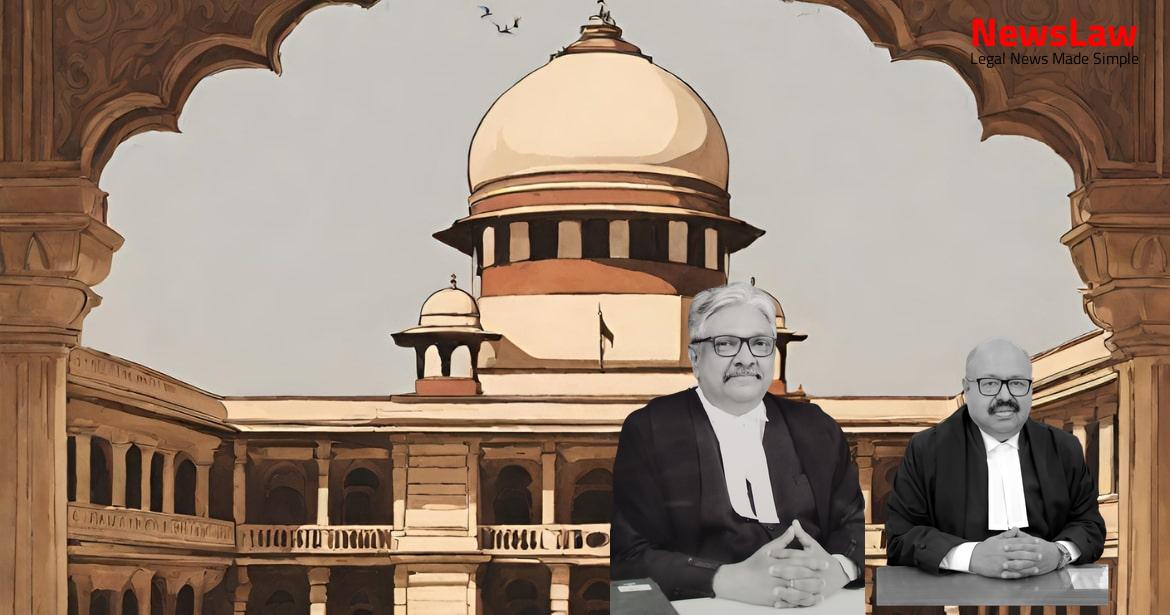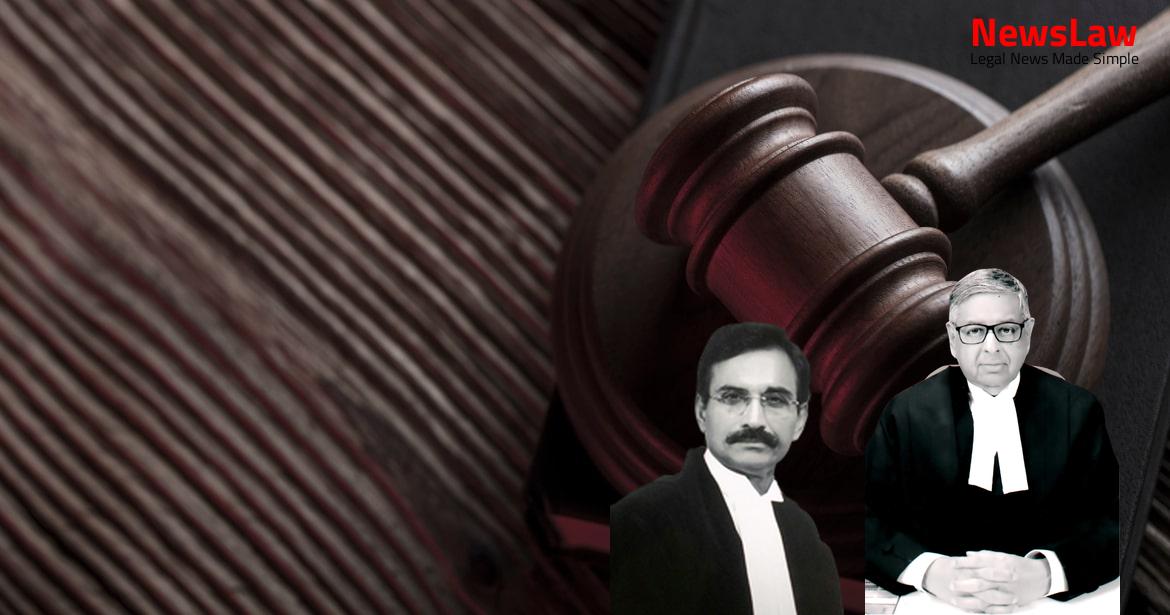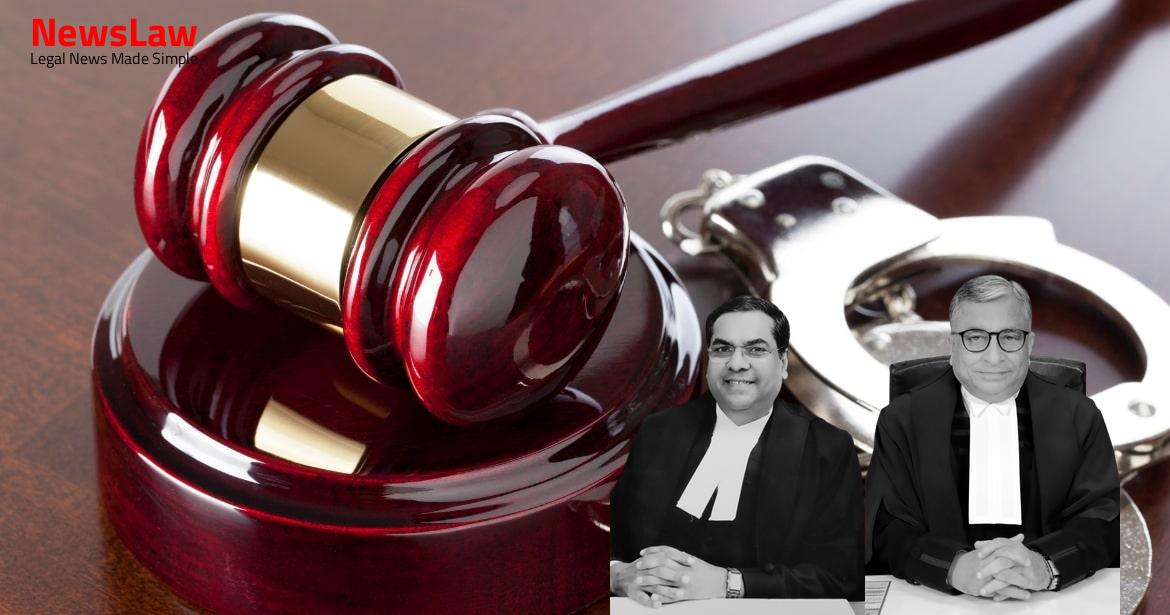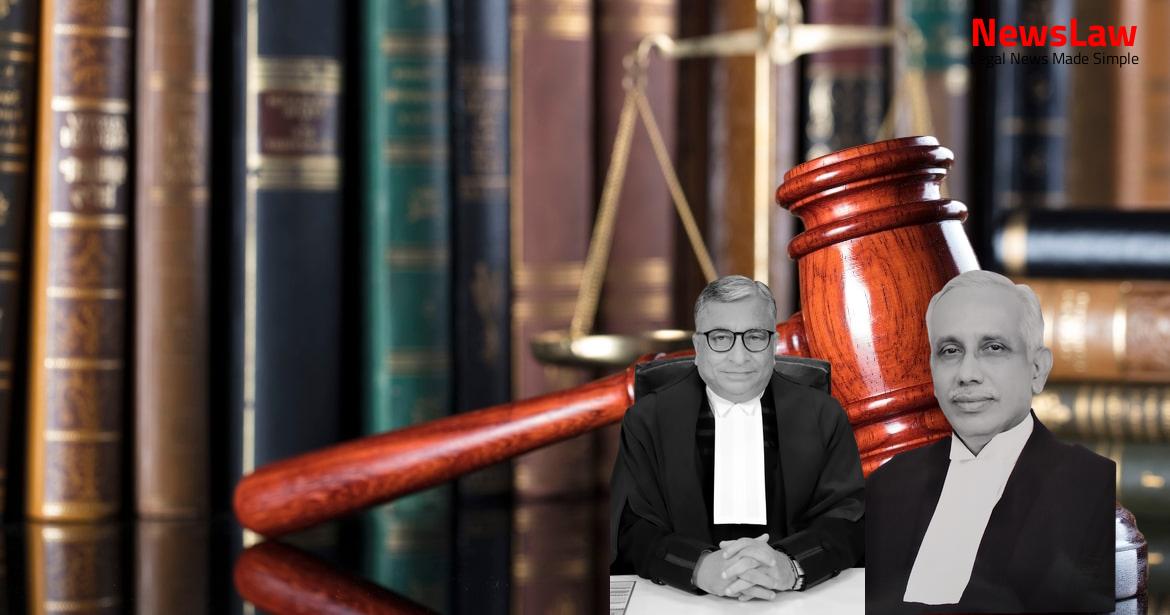Explore the in-depth legal analysis conducted by the court in a recent case centered around a contract dispute involving the Sales of Goods Act. The case delves into various sections of the law governing the sale of specific goods, implied conditions and warranties, passing of property, and remedies for breach of contract. This blog post will provide a comprehensive overview of the court’s interpretation and application of the law in the context of the contract dispute, shedding light on key legal principles and implications.
Facts
- The NCLT admitted an application under Section 9 of the IBC against the second respondent.
- The third respondent was appointed as the Interim Resolution Professional and a moratorium followed.
- The appellant is an ex-director of the second respondent.
- The NCLAT dismissed the appeal filed by the appellant challenging the NCLT’s order dated 28.05.2020.
- Respondent No. 2 filed two civil suits claiming damages against different parties.
- An application under Section 9 was filed by respondent No. 1 against respondent No. 2 on 30.04.2018.
- A reply was filed by respondent No. 2 pointing out a pre-existing dispute and seeking dismissal of the application under Section 9.
- The appellant’s claim of a pre-existing dispute was rejected by NCLT and affirmed by NCLAT.
- The supply of coal began on 28.10.2016 and ended on 02.11.2016.
- The total moisture content of the coal was less than 40% +/- 2%.
- Out of 500 Metric Tonnes, the second respondent was supplied 412 Metric Tonnes.
- The first respondent raised a claim for Rs. 21,57,700.38 on 03.02.2018.
- Judgment was reserved on 20.11.2019
- Supply was stopped pursuant to the reserved judgment
Also Read: Interpretation of Custody in Contempt of Court Case
Arguments
- The petitioner contends that a term in a contract of sale of goods may be a condition or a warranty.
- The suit’s filing period under the limitation does not align with Section 9 of the IBC.
- The appellant establishes a pre-existing dispute through filed suits and significant court fees paid.
- Specific material in the boilers indicates the total amount of raw materials.
- Referring to Sales of Goods Act, Section 12 is highlighted.
- The respondent argues the only pre-existing materials are three emails.
- An argument is made regarding the quality of goods under warranty.
- Section 41 of the Act is referenced about buyers’ rights to examine goods.
- A 3-year suit filing period contrasted with the claim amount is discussed to establish genuine dispute.
- Interpretation of emails, delivery dates, and quality deficiency are debated by both parties.
- The right to reject goods and the exercise of such right is a key contention.
- Rule 150 of NCLT Rules is presented as a directory provision.
- The respondent emphasizes the need for evidence to support the dispute.
- Sections 41 and 42 of the Sales of Goods Act are reiterated.
- Reference to a purchase order guarantee and the discord with delivered goods is highlighted.
- The appellant registered a protest upon discovering non-conforming goods.
- Non-compliance with NCLT Rule 150’s timeframe for pronouncing orders is pointed out.
- Details about the supply timeline of goods are mentioned.
- Appellant argues that no damage occurred until 03.11.2016 warranting a debit to the respondent’s account.
- Non-compliance consequences are not specified.
- Citing Balwant Singh v. Anand Kumar Sharma, appellant contends desired results cannot follow.
- No evidence of dispute shown in documents; no suit or arbitration initiated under Section 9 of IBC.
- Lack of evidence in accounts to prove loss to the corporate debtor from unused coal.
- Argument that lack of worthwhile evidence makes dispute appear spurious.
- Third respondent is the Interim Resolution Professional represented by senior counsel.
- NCLT task is not mechanical, submission made on behalf of corporate debtor.
- Argument made for exhaustive survey of the Act, reference to second respondent’s continued consumption despite alleged deficiency.
- Claims of dispute by second respondent considered sham, alleged variations not constituting a credible dispute.
- Email dated 03.11.2016 mentioned debiting further damage to respondent’s account, duty to ascertain credible existence of dispute.
Also Read: Enforcement of Arbitral Award – Court’s Legal Analysis
Analysis
- The analysis section focuses on the interpretation and application of various sections of the law in the context of the case at hand.
- It discusses the implications of Section 13(2) which deals with the acceptance of goods by the buyer and the ensuing obligations.
- The role of implied conditions and warranties as provided by the law is highlighted in relation to the sale of specific goods.
- The significance of passing of property in determining rights and obligations between the parties is explained.
- Specific examples and scenarios are used to illustrate how the law applies in cases of breach of conditions and warranties.
- The examination includes references to previous legal judgments, such as the Mobilox Innovations Private Limited case, to support the arguments being made.
- The analysis reflects a deep dive into the legal framework governing contracts of sale of goods and the rights of buyers and sellers in such transactions.
- Section 14 provides for certain implied warranties and conditions.
- Section 59 allows the buyer to sue the seller for damages for breach of warranty.
- Section 19 determines when the property passes from the seller to the buyer.
- Section 55(1) contemplates that property in the goods has passed to the buyer.
- Section 17 deals with sales by sample and implied conditions.
- Section 13 allows the buyer to waive a condition or treat a breach as a breach of warranty.
- Section 59 provides remedies for breach of warranty.
- Section 55(2) allows the seller to sue for the price if payable on a certain date.
- Chapter V deals with the rights of the unpaid seller against the goods.
- Chapter VI deals with suits for breach of contract and payment conditions.
- In the judgment of Mangilal Karwa v. Shantibai, the court discussed the concept of a cross-claim and its application in determining the buyer’s right to reject goods of inferior quality.
- The Chancery Division’s judgment in Hayes v. Hayes under the UK Insolvency Rules highlighted that a genuine and substantial cross-claim does not require a claim to be strong or likely to succeed.
- The judgment emphasized that even after the buyer takes possession, the seller’s duties may still be incomplete if there is a breach of conditions or warranties in the contract.
- The court explained that the buyer’s right to reject goods due to inferior quality is established law, even if the goods have been physically delivered.
- In the context of Article 54 of the Indian Limitation Act, the court discussed the requirement that a fixed date for performance must be refused for the article to apply.
- Finding that NCLAT erred in its conclusion regarding pre-existing dispute
- Interference with impugned order based on the above finding
- No pronouncement on factual issues pertaining to suits filed by the second respondent
- Observations made are for the purpose of deciding the appeal
- Permission for the first respondent to argue that the second respondent may have waived the alleged condition under Section 13 of the Act
Also Read: Supreme Court’s Analysis on Advocates On Record System
Decision
- The impugned order is set aside.
- The application filed by the first respondent against the second respondent under Section 9 is rejected.
- The appeal is allowed.
Case Title: RAJRATAN BABULAL AGARWAL Vs. SOLARTEX INDIA PVT. LTD. (2022 INSC 1081)
Case Number: C.A. No.-002199 / 2021



